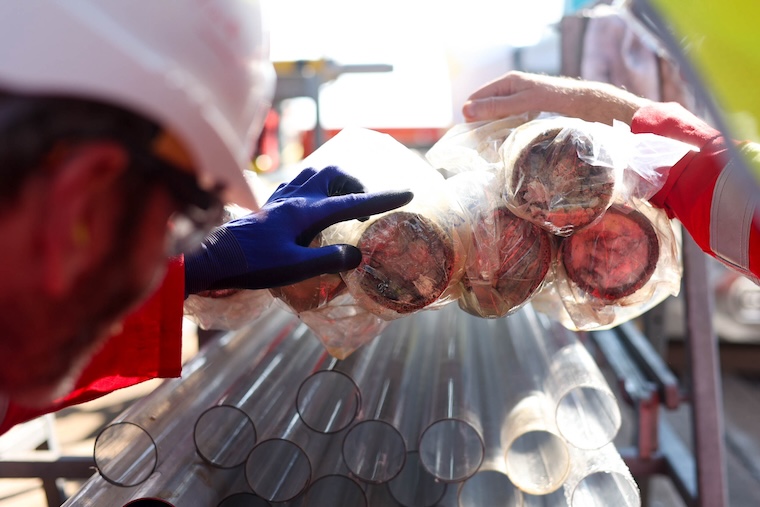Now, scientists will begin to unlock those fossilized secrets, thanks to an ocean expedition co-led by UC Santa Cruz Professor Christina Ravelo. On February 22, the international team of researchers announced that they have obtained a “high-resolution continuous record” of environmental data from ancient reefs off the coast of Hawai’i. In total, they collected almost 1,400 feet of coral from depths ranging from about 400 to 4,000 feet.
“We are also delighted to have recovered many samples of annually banded fossil corals that will be used to obtain, for the first time, detailed records of monthly changes in oceanographic conditions from past periods that were different than today,” said Ravelo, a professor of ocean sciences. “The idea is to use this data to inform predictions of future Pacific-wide climate change.”
Letting coral speak
The coral has been opened, analyzed, and sampled by the researchers, and in the months ahead, they will use cutting-edge methods in their labs to extract more information from the cores about sea-level and climate changes. They hope to better understand the mechanisms that cause such phenomena, including abrupt events, as well as the impact of these changes on reef growth and health.The “Hawaiian Drowned Reefs” expedition was part of the International Ocean Discovery Program (IODP), a publicly funded collaborative supported by 21 countries, which explores Earth's history and dynamics recorded in seafloor sediments and rocks – as well as monitoring sub-seafloor dynamics. The expedition was conducted by the European Consortium for Ocean Research Drilling (ECORD).
The expedition team included 31 scientists of different disciplines from around the world. Ten of them sailed aboard the multipurpose vessel MMA Valour in September and October 2023 off the coast of Hawai’i, using a remote-controlled system to collect the coral cores. Cameras were mounted on the system so the researchers could see and avoid any live coral, which rarely grow at the depths where they were collecting the cores, Ravelo said.
After that offshore phase of the expedition, the entire team met in Germany, at the Center for Marine Environmental Sciences, at the University of Bremen, to begin interpreting the data from the coral skeletons.
The team of scientists will continue to work on the samples and data in the coming years at their home laboratories during this onshore phase of the expedition. Then, after a one year-moratorium, the material and data will be archived and made accessible to the international scientific community for further scientific research, with findings expected to be published in the months and years ahead.
“We were able to recover a spectacular sequence of fossil coral-reef deposits that will enable us to decipher in unprecedented detail how sea level, paleoclimate, and the reef ecosystem has changed over the past 500,000 years, particularly during periods of rapid global change,” said Jody Webster, a geosciences professor at the University of Sydney, Australia, who co-led the expedition alongside Ravelo.



